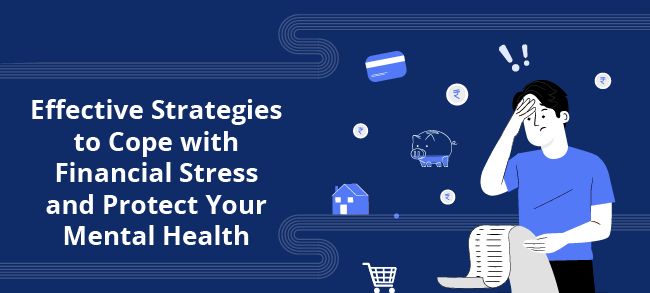Financial stress is a silent killer that consistently builds up in our minds and significantly impacts the mental health of individuals belonging to all age groups. Adhering to certain coping strategies promotes the understanding of the financial crisis and allows one to handle the situation in a smooth manner which will have a positive impact on mental health.
Factors contributing to financial stress
The reasons for financial stress can be widespread, with experts categorising them as stressor events. The primary factors that lead to financial stress include:
- Debt
- Job insecurity
- Paying off bills
- The pressure of managing finances during uncertainty
- Inability to meet present financial needs
Consequences of financial stress
Chronic stress resulting from financial obligations can lead to:
- Increased anxiety
- Depression
- Relationship problems
- Physical illnesses
The first step is to accept the problem and then adopt strategies to regain control of finances and mental health. Many of us, regardless of our economic status, deal with financial hardship at some point. In such situations, appropriate coping strategies can help preserve peace of mind.
How to cope with financial stress?
Recognise Your Emotions and Respect Yourself
Be strong and accept the emotions associated with financial stress. Talk to a close friend or consult a therapist about the feelings that bother you, which can provide emotional relief and valuable support to help you cope with challenges.
Plan a Budget and Stick to It
Track your income and expenses meticulously. Make a list of expenses you cannot do without and look for areas in your budget where you can reduce spending.
Seek Professional Help
When facing financial difficulties, don’t hesitate to consult a financial planner or credit counsellor. They can offer counselling services and devise a debt management plan.
Explore Debt Relief Options
You can look at debt consolidation, debt settlement, or bankruptcy depending on your needs. Seek advice from financial professionals before making any major decisions.
Prioritise Self-Care
Self-care often takes a back seat during financial hardship. Prioritise activities that promote your overall well-being, which include:
- Meditation and breathing exercises to manage anxiety and improve concentration
- Regular physical activity to reduce stress and improve mood
- A healthy diet and adequate sleep to forge resilience
Limit Exposure to Financial Triggers
Frequently reviewing your bank statements or watching or reading financial news can exacerbate anxiety. Hence it is important to set boundaries and limit the exposure to such triggers.
Focus on What You Can Control
While you can’t control certain aspects, focus on what you can control such as your budget, your spending, dressing and self-care routine, this empowers you by overcoming the feeling of helplessness.
Celebrate Small Wins
Celebrating a small success boosts confidence and motivates you to achieve more.
Many people experience financial stress, and one should realise they’re not alone. Reaching out for help is a sign of strength; hence one should not hesitate to seek support for overcoming challenges, which will go a long way towards preserving their mental health.
–Content partner Happiest Health







